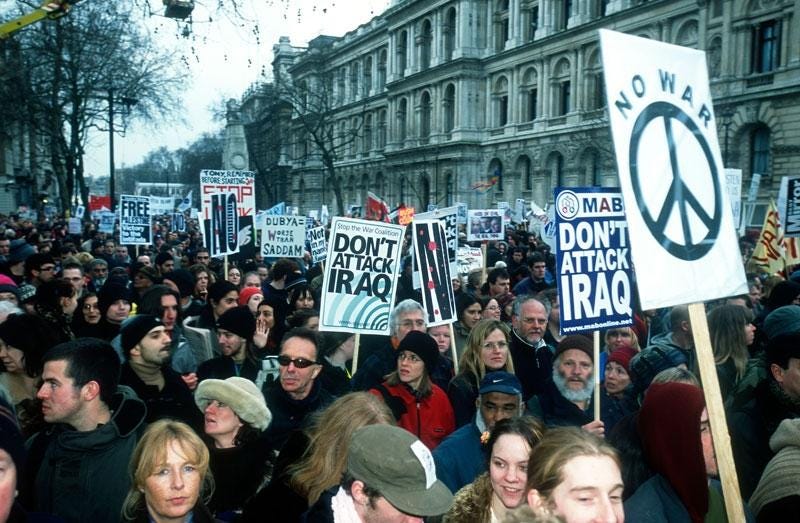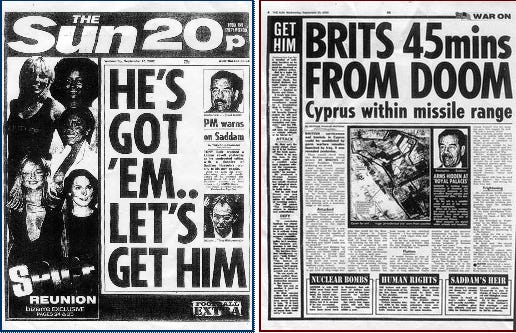Whatever Happened To Anti-War Protests?
Social Media and the lurch toward the age of the mono-narrative
It’s a remarkable thing to consider that we’re standing on the edge of nuclear war and nobody is even protesting about it in the streets. In another example of ‘‘High Strangeness’’ the unnerving phenomenon or feeling that something is a little out of kilter, like a picture hanging slightly slanted on a wall. People will now use the protests in 600 cities — with a million people protesting in London— against the 2003 Iraq war as an example that protests don’t matter. It’s true, the war went ahead anyway, but we can at least see a politically engaged populace, mainly of the left, deploying their agency and expressing their disgust at their political class.
Or perhaps I’m wrong and it’s different this time. Perhaps the risk of dying in a nuclear war is worth it because, after all, Putin did invade Ukraine. The problem with this form of relativism is that Saddam Hussein was also depicted by the Western media as a blood thirsty maniac, quite literally the ‘‘Butcher of Baghdad’’ and our free and glorious Western media brought us such objective journalism as this:
To be fair there were media outlets such as The Guardian who were highly critical of the Blair regime’s wars, as well as a host of pundits and political commentators. The tendency of Old Left dinosaurs such as Jeremy Corbyn, Galloway or earlier, Tony Benn, was to oppose all war on principle and seek to de-escalate it and begin negotiations as swiftly as possible.
It isn’t just the Iraq war either. Western populations have a long history of protesting against NATO’s expansionism with the 1999 bombing of Serbia being particularly unpopular. Indeed, you can trace a popular anti-war sentiment going back at least as far as the Vietnam war.
So what happened? Why can Western leaders funnel into Ukraine a seemingly unending supply of money and weapons without so much as a murmur from the public who are suffering rampant inflation and crippled energy supplies and the prospect of having themselves and their families incinerated?
Remember how excited Western plutocrats were by the Arab Spring back in 2011? The so-called ‘‘Facebook Revolutions’’ in which the liberating principles of social media could finally be transformed into genuine ‘‘People Power’’ and the authoritarian tyrants of the Middle East and North Africa would be made to yield in the face of a population crying-out for Western lifestyles and consumerism. It didn’t exactly work-out that way, but the potential for less bloody and expensive forms of regime change was apparent in the new technology and deep-state spooks took note.
Finally, the Great Leveler had arrived. Now the little people would have the ability to enact social change using social media, and as long as that entailed the little people destabilizing America’s enemies, things were just great, it was democracy in action.
On the other hand, when the little people in Alabama or Hull, Texas or North Yorkshire began expressing their people-power via the same mediums, then it was a threat to democracy, toxic populism and hate.
The ‘‘democratizing’’ effect of social media, which was loftily defended by Western elites in the Middle East and North Africa, was also blamed for Brexit and the election of Donald Trump, and that just wouldn’t do.
However, it isn’t just a matter or de-boosting and algorithmic manipulation as well as outright censorship and, increasingly, ‘‘de-banking’’ but the drive toward a full-spectrum narrative control.
I was never the biggest fan of lefty anti-war protesters, even if today I’d mainly agree with their sentiment, they’re still as obnoxiously sanctimonious and hysterical as ever. But what seems to have happened is that the enforced ‘‘mono-narrative’’ structure of Western political discourse has squeezed out and killed-off all manner of sub-groups and political traditions.
The great liberator of social media has been utterly turned on its head and become the most efficient mechanism for political conformity in history. A platform like YouTube or Twitter is the digital version of the mono-culture industrial farm and mass anti-war protests appear to be just a species of butterfly or beetle we don’t see around anymore.
Some years ago when people began realizing that after a long drive on a summer’s afternoon they had no bugs splattered on their windscreens they’d pause, and ponder if it had always been like this;
‘‘I used to have to turn the wipers on to clear off all the insects, but now…nothing’’
Was it always like this? is it just me?
Similarly, there’s a sense of High Strangeness when we take a moment and consider that we’re witnessing artillery being fired on nuclear power plants and routine threats of nuclear escalation, and there are not millions of people demanding that the madness cease immediately.
Isn’t it, a little weird….





There was another article knocking about a while ago from Raheem Kassam (I know, but I like to keep abreast of the MAGA stuff, and what they're up to over there) , which detailed the same thing around the anti corporate globalisation riots that used to happen. Remember when the WEF conferences and G20 summits used to have "black blocks" smashing up cities, and literally tens of thousands of lefty protestors? All gone now.
I have no idea exactly what's happened but I guess whether it's anti war or anti corporate protests it takes a lot of money and organisation to actually make it happen. From memory I think his headline was "How the rich ate the left", which sounds about right.
Could it be that people have become demoralised by perceived insurmountable, existential threats? After covid lockdowns, realising that voting & protesting do nothing, constantly being told that the environment is collapsing and now the doom of being told that energy, food & fuel are always going to cost more than you can afford they've just given up hope?
Like the rats in Curt Richters Drowning Buckets experiments in the 50s they've learned that there is no hope and given up fighting?
I don't know, I see lots of people my age saying "I'm glad that I won't be around for much longer" online, are these people tired of life?
Whenever I see footage of people being executed I always think why don't they fight, struggle, at least die on their feet defiant but often they meekly do as they're told, follow the orders, accept the noose or the blade.
Maybe many of us are just so soft, medicated, apathetic & bored that as long as we don't need to actually do anything the idea of dying isn't so bad. Perhaps the maniacs that run the world really have broken the spirit of man.